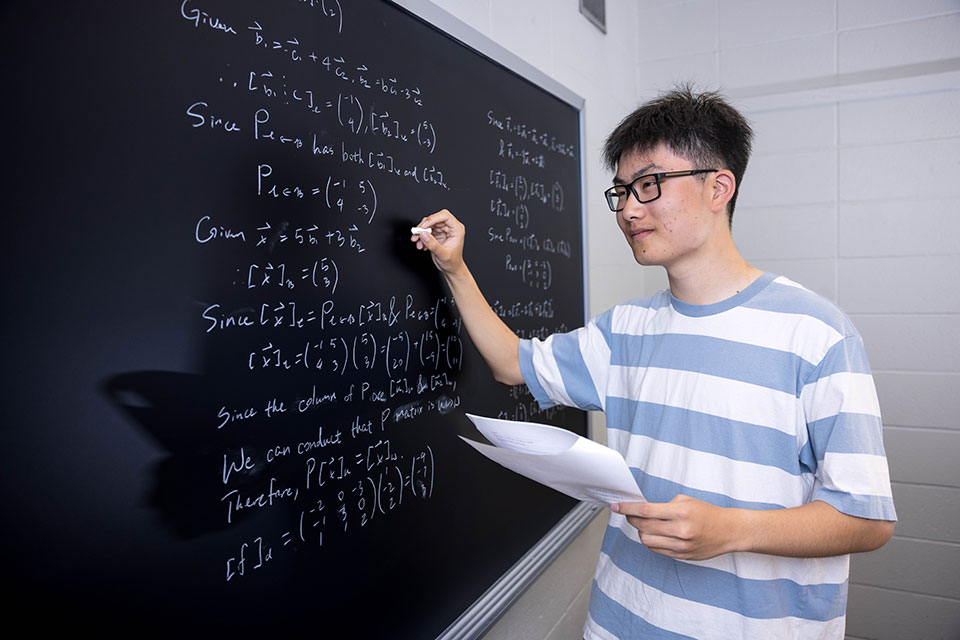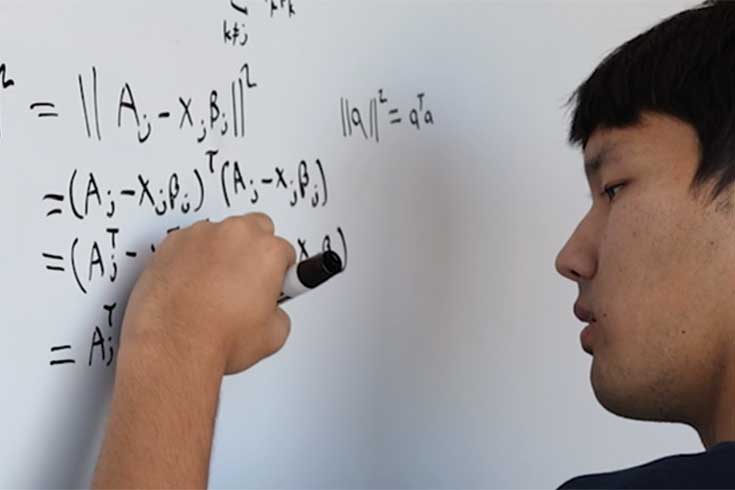Undergraduate Degree Programs
The Department of Mathematics offers three degrees: Bachelor of Arts in Mathematics, Bachelor of Science in Mathematics, and Bachelor of Science in Applied Mathematics.
This is a testament to the fact that mathematics is both a subject of the greatest inherent depth and beauty with a history extending from antiquity, and also a powerful tool for understanding our world.
By studying mathematics, you'll be introduced to fundamental fields—algebra, real and complex analysis, geometry and topology—and to the practice of applying mathematical ideas in the real world. Our curriculum includes courses in calculus, linear algebra, abstract algebra, real and complex analysis, topology, differential geometry, differential equations, number theory, combinatorics, statistics and probability, dynamical systems, numerical methods, modeling, and optimization. As a mathematics major, you'll be well prepared for graduate study, as well as for a career in scientific research, finance and actuarial science. Whatever path you choose, we also want you to love mathematics for its own sake. As Albert Einstein said, "Pure mathematics is, in its way, the poetry of logical ideas."
Applications of mathematics to physics, biology, chemistry, economics and social sciences have proved particularly fruitful, and have led to the development of new mathematical tools and methods. The Applied Mathematics major will introduce students to the essential tools used in such applications. It will prepare students for professional careers in public institutions, research centers or private companies using quantitative methods (such as modeling, data analysis or optimization) to understand and solve complex real-world problems.
Why Brandeis?
Our department is small, flexible and friendly. It’s also intellectually rigorous. Our faculty’s accomplishments have placed it among the top departments in the country.
And speaking of our faculty, they are not only outstanding academicians, they are also dedicated teachers and mentors. Especially in advanced-level courses, you’ll often find them in the audience while a student lectures. By fostering dialogue among all members of the department, we aim to bring mathematics to life.
A separate teacher preparation track leads to a license to teach high school in the state of Massachusetts. The major in applied mathematics provides several tracks for students seeking to use mathematical tools in the physical and computational sciences, or in economics and finance.
Just beyond Brandeis, you’ll find an area teeming with first-rate universities that create a mathematical community of great diversity and depth. In addition to attending lectures, seminars and colloquia, you’ll have many opportunities for contact with mathematicians at Boston College, Boston University, Harvard, MIT, Northeastern, Wellesley, and Tufts.
Undergraduate Degree Programs
Expand All
By studying mathematics, you'll be introduced to fundamental fields—algebra, real and complex analysis, geometry and topology—and to the habit of mathematical thought. Our curriculum includes courses in calculus, linear algebra, abstract algebra, real and complex analysis, topology, differential geometry, differential equations, number theory, combinatorics, statistics and probability theory.
As a mathematics major, you'll be well prepared for graduate study, as well as for a career in scientific research, finance and actuarial science. Whatever path you choose, we also want you to love mathematics for its own sake. As Albert Einstein said, "Pure mathematics is, in its way, the poetry of logical ideas."
Review the requirements for the BA in Mathematics.
By studying mathematics, you'll be introduced to fundamental fields—algebra, real and complex analysis, geometry and topology—and to the habit of mathematical thought. Our curriculum includes courses in calculus, linear algebra, abstract algebra, real and complex analysis, topology, differential geometry, differential equations, number theory, combinatorics, statistics and probability theory.
As a mathematics major, you'll be well prepared for graduate study, as well as for a career in scientific research, finance and actuarial science. Whatever path you choose, we also want you to love mathematics for its own sake. As Albert Einstein said, "Pure mathematics is, in its way, the poetry of logical ideas."
Review the requirements for the BS in Mathematics.
With the advent of big data, our world has become more quantitative than ever. Our ability to collect and process enormous amounts of data has revolutionized almost every aspect of our lives, from medicine to climate prediction, from risk management to marketing strategies.
As an applied mathematics major, you'll acquire the tools and methods of the field's main frameworks—probability, mathematical modeling, numerical analysis and differential equations—and learn to develop mathematical models to solve real-world problems. You'll learn to apply this knowledge across many disciplines, including biology, chemistry, economics, engineering and social sciences. In fact, applied mathematics might interest you as a second major if you are already majoring in physics, computer science, biology, neurobiology, economics, or business.
The bachelor of science degree program was developed in response to the need for applied mathematicians to model solutions for the world's most pressing problems. As a well-trained applied mathematician, you will have highly-valued skills that will open doors to career opportunities at public institutions, research centers or private companies that use quantitative methods to understand and solve complex problems. You'll also be well-prepared to pursue further study and a career in academia.
Review the requirements for the BS in Applied Mathematics.
Faculty and Student Excellence
Expand All
Our faculty are not only dedicated teachers, they are scholars who are widely recognized for their work. Here are some recent faculty highlights:
- Ruth Charney, Theodore and Evelyn Berenson Professor of Mathematics, was elected President of the American Mathematical Society, which has approximately 30,000 members, a staff of around 200, and offices in Providence, Ann Arbor, and Washington, DC. Her appointment is for 4 years, beginning February 1, 2020, which includes 1 year as President-Elect, 2 years as President, and 1 year as Past-President.
-
Jonathan Touboul applies mathematical tools to biological questions, including understanding the interplay of structure and function in the brain.
-
Thomas Fai's research deals with the scientific computing and mathematical modeling of complex biological fluids, including the fluids inside of blood vessels and cells. Before coming to Brandeis, he was an NSF Postdoctoral Fellow at the School of Engineering and Applied Sciences at Harvard.
-
John Wilmes received the Outstanding Postdoctoral Research award from the College of Computing at the Georgia Institute of Technology. At Brandeis, John studies the symmetries of discrete structures and developing rigorous analyses of machine learning algorithms.
-
Professor Bong Lian is a principal investigator on a newly awarded Simons Collaboration on Homological Mirror Symmetry.
Ben Kamen, a sophomore mathematics major, placed 100th out of 1593 competitors in the national 2020 Putnam Mathematical Competition, which is the “preeminent mathematics competition for undergraduate college students in the United States and Canada.” During the event, competitors need to find a “trick” or “insight”, Ben says, in order to try to reduce the problems given to something “known.” At Brandeis, Ben attends the twice-weekly Putnam seminars to work on fun past Putnam problems run by Professor Kiyoshi Igusa and graduate student Tudor Popescu. In addition to the Putnam, Ben enjoys participating in the Cycling Club for scenic rides in Weston, MA. Ben works currently as a valued grader for the mathematics department and manages a 22-credit course load. By taking courses at this rate, he hopes to obtain a BA/MA degree. He does not currently know his research goals, but hopes to start work on problems in Geometric Group Theory in the near future.
Graduate Study, Careers and Alumni
Expand All
Our mathematics majors often choose to continue their studies in mathematics or statistics. In 2017, for example, Brandon Shapiro received a National Defense Science and Engineering Graduate Fellowship to support his PhD studies in mathematics at Cornell University.
Others pursue careers in scientific research, finance, actuarial science or teaching math. Recent graduates include an elementary school math specialist, an actuary at MetLife, a senior financial analyst, an accountant and a speech language pathologist.
Many Brandeis mathematics majors have become well-known mathematicians, including:
-
Ruth Charney ’72, professor of mathematics at Brandeis and current president of the Association for Women in Mathematics.
-
Robert Zimmer ’68, president of the University of Chicago.
-
Ulrike Tillmann ’85, professor of mathematics at the University of Oxford.
-
Harald Helfgott ’98, researcher at CNRS/ENS in Paris and winner of the Leverhulme, Whitehead and Adams prizes.
-
Thordur Jonsson ’76, professor at the University of Iceland.

